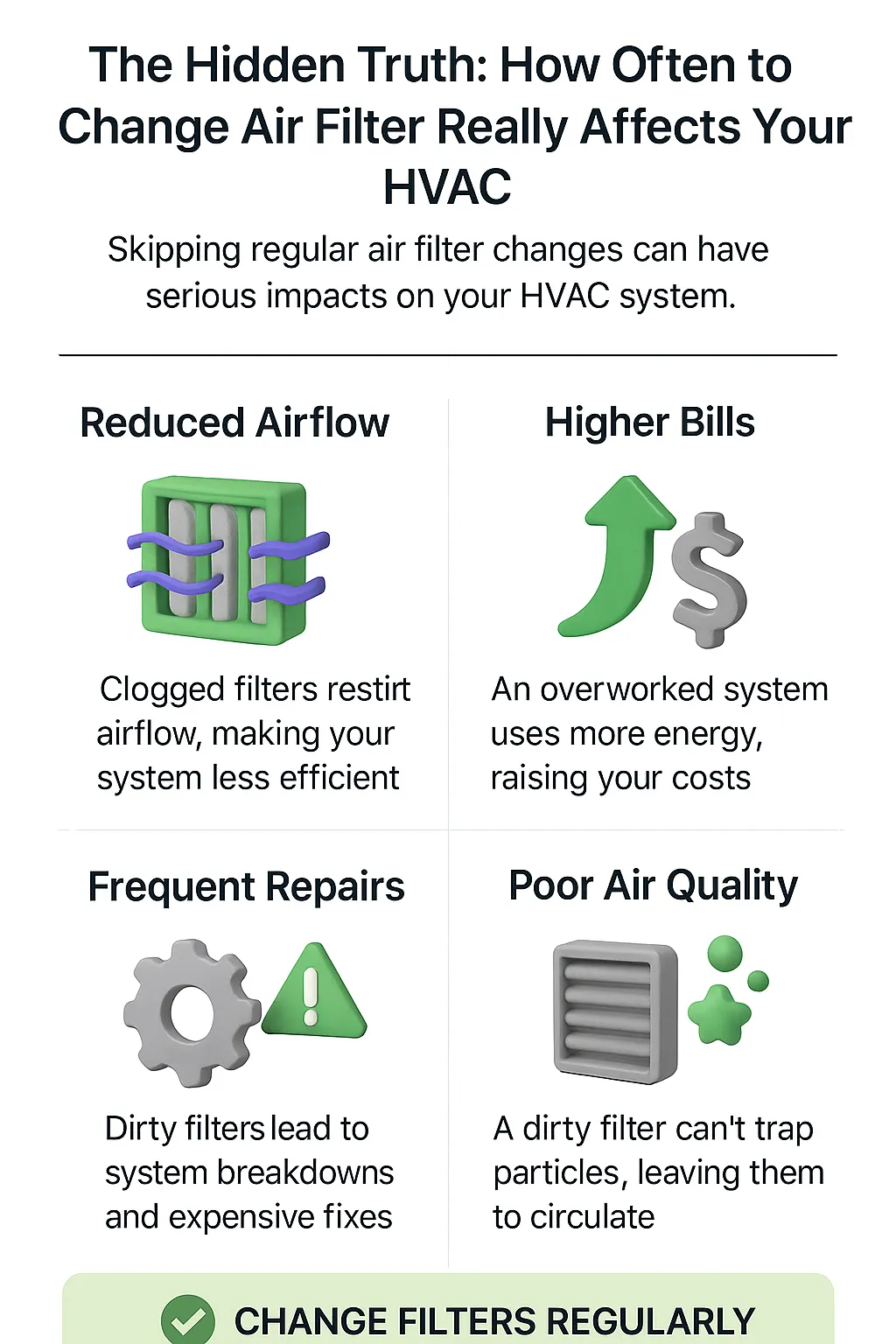Through technician insights, real-world examples, and government-backed data, we’re revealing the hidden truth about how often to change air filter—and why it matters more than you think.
Key Takeaways
Waiting too long to replace your air filter leads to poor airflow, reduced air quality, and higher energy bills.
Homes with pets, allergies, or smokers should change filters every 30 to 45 days.
Dirty filters can increase HVAC energy use by up to 20%.
Filters help capture indoor pollutants, many of which originate inside the home.
A small maintenance habit can save you from major repairs down the line.
Why Filter Changes Matter More Than You Think
At first glance, a filter may not seem like a big deal. But behind the scenes, that small component plays a massive role in your HVAC system’s performance. When filters become clogged with dust, pet dander, or pollen, your system has to work harder to move air through. This puts extra strain on the blower motor, reduces efficiency, and dramatically affects your home’s air quality.
So how often should you replace your air filter?
Every 30–60 days if you have pets or allergies
Every 90 days for standard households with no pets
Every 6–12 months in rarely used or seasonal homes
These recommendations aren’t just guesses—they come from actual HVAC service records, performance testing, and experience from field technicians who’ve seen what delayed maintenance can do.
Field Insight: What HVAC Experts See Every Day
“I’ve worked on thousands of systems, and the pattern is always the same—filters are ignored until the system starts failing. We’ve seen energy usage drop 15% just from a filter replacement. It’s simple maintenance that pays off big.”
Real-World Examples: What Happens When You Wait
Case 1: A Costly Lesson in Florida
A family of four with two dogs went six months without replacing their filter. The HVAC system overheated during a summer heatwave, and the blower motor burned out. The repair? $900—all avoidable with monthly filter changes.
Case 2: Allergy Relief in a Small Apartment
A renter in Los Angeles struggled with constant coughing. After switching to a MERV 8 filter and replacing it every 45 days, her symptoms drastically improved within two weeks. Cleaner air led to better sleep and fewer doctor visits.
What the Numbers Show
Up to 20% increase in energy use due to clogged filters (Source: U.S. Department of Energy)
5–15% savings on annual energy costs from routine replacements (Source: energy.gov)
Indoor air pollutants originate inside (pet dander, mold, cleaning agents) (Source: EPA.gov)
CDC recommends regular filter swaps in schools to limit airborne illness (Source: cdc.gov)
These facts confirm what HVAC professionals see every day: clean filters improve efficiency, protect your system, and keep your family healthier.
Final Opinion: What We’ve Learned From the Field
In hundreds of home visits, one truth always stands out—most people wait too long to replace their air filters. By the time issues arise, damage has often already begun. Homes with pets, allergies, or high usage demand more frequent care. We’ve seen filters so packed with dust they choked the airflow entirely—triggering system breakdowns and avoidable expenses.
Our recommendation: don’t rely on manufacturer timelines alone. Base your schedule on how you live. If your HVAC system could talk, it would ask for a fresh filter far more often than you think.
What You Can Do Now
Inspect your filter today. If it’s discolored or dusty, swap it.
Follow this replacement guide:
Pets or allergies: every 30–45 days
Average home: every 90 days
Light-use homes: every 6–12 months
Buy filters in bulk so you never run out.
Replace it yourself or hire a pro for a quick service check.
Set calendar reminders or use a home maintenance app.
Track your changes with a simple checklist.

Frequently Asked Questions
Why does changing my air filter matter for HVAC performance
Your air filter protects your HVAC system from dust, debris, and pollutants. When it becomes clogged, it restricts airflow, forcing the system to work harder. This leads to reduced efficiency, higher energy bills, and potential system breakdowns.
How often should I change my air filter to protect my HVAC
Most homeowners should change their filter every 60–90 days. However, if you have pets, allergies, or high system usage, changing it every 30–45 days ensures better protection and efficiency.
What are signs that my air filter is overdue for a change
Look for visible dust buildup on the filter, musty odors, increased allergy symptoms, or inconsistent heating and cooling. If your HVAC system is running longer than usual, the filter may be to blame.
Can delaying filter changes really cause damage
Yes. Ignoring filter maintenance can lead to overheating, frozen coils, and blower motor failure—some of the most common and costly HVAC repairs.
Is there a difference between cheap filters and higher-end ones
Yes. The key is the MERV rating—not the price. Higher MERV-rated filters (8–13) trap smaller particles and offer better protection. Choose a filter that matches your HVAC system’s specifications and your air quality needs.
Knowing how often to change your air filter is one of the simplest ways to safeguard your HVAC system—and yet it’s one of the most commonly overlooked maintenance tasks. As emphasized in HVAC System Repair in Cutler Bay, FL, clogged filters force your system to work harder, resulting in higher energy bills and more frequent repairs. Choosing the right replacement is equally important, and platforms like Air Filter for Home make it easier to find quality filters tailored to your needs. Just as music lovers tune into the nuances of rhythm and harmony at events like Exploring the Power of Jazz Festivals Around the World, homeowners benefit from tuning in to their indoor air quality and system performance. Making informed, timely decisions—like those encouraged by The Benefits of Working With a Woman-Owned Marketing Agency—is key to achieving lasting comfort, health, and cost savings.